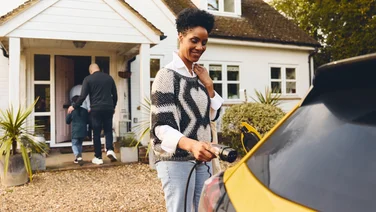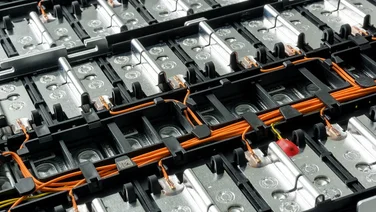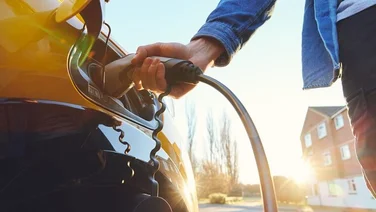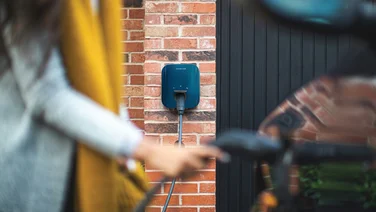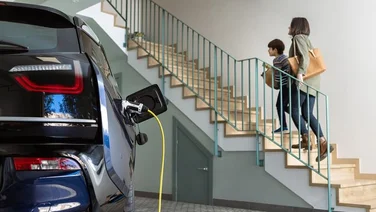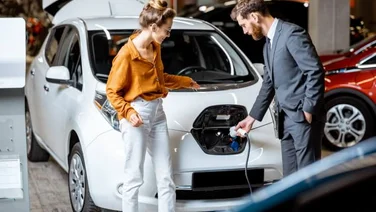We receive a small fee from trusted installers when you request a quote through our site. This helps us keep our content independent, well-researched and up to date – Learn more
- Do you need a driveway to charge an electric car?
- How to charge your electric car without a driveway
- Can you get an electric car charger if you live in a flat?
- Can you run your electric car charging cable across the pavement?
- Is there a portable charging system for electric cars?
- Can you own an electric car without a home charger?
- Summary
- You don’t need a driveway to charge an electric vehicle at home
- The government is encouraging councils to install on-street charging stations
- Drivers can rent out private EV chargers through peer-to-peer charging
Want to invest in an electric vehicle (EV) but worried about where to recharge the battery? You’re not alone. This is the key reason why most people have invest in an EV chargepoint.
But what if you don’t have a driveway to house an EV charger? We’ll show you what the alternative options are. Once you’ve read this article, you’ll have a better idea of whether your home will be suitable for a home charger without a driveway.
Then you can crack on with the exciting stuff – comparing quotes. You can speed up this process by using our quick comparison tool. Simply provide a few details about your home, and we’ll pass them on to our expert installers.
Get free EV charging point quotes
Answer a few quick questions, and our trusted installers will send you bespoke EV charging point quotes – for free.

Do you need a driveway to charge an electric car?
There is a common misconception that only people with driveways can invest in a home charger, which isn’t the case. Having a driveway certainly makes it easier for someone to charge their electric vehicle – but it isn’t a necessity.
If you don’t have a driveway, don’t let it hold you back from getting an electric vehicle. There are a handful of other ways to replenish your car’s battery before starting the day.
How to charge your electric car without a driveway
Ask your local council to install an EV charger on your street
If you don’t have a driveway, it’s a good idea to suss out whether there’s any on-street charging in your area. At least this way you can still charge your EV from almost the comfort of your own home – just a few extra metres away.
Depending on where you’re located, you should find a range of different types of charging stations; some councils are even installing them onto lampposts to save space.
If you already have on-street charging in your area, perfect! Simply plug in and wait for your car battery to be restored – but remember not to leave your car there overnight. Although this is perfectly safe, other people in the area might also want to use the charger, and you don’t want to be that person hogging the charger.
Don’t have any nearby on-street charging? This will probably be the case if you live in a rural area. But don’t fret, you can contact your local council to get an EV charger installed. Local authorities are being encouraged by the government to improve EV infrastructure, through the introduction of the On-Street Residential Chargepoint Scheme.
Charge your electric car in public places
It might not be as convenient as a home charger, but there are plenty of public charging spots to choose from.
And if you’re in the UK, chances are you’re never too far away from a charging spot, which is only likely to get more common in the coming years. Between December 2021 and December 2022, there was a 31% increase in the total number of charging devices on UK streets.
When it comes to charging your car in a public spot, there are a few different types of chargers you should be aware of.
You’ll find a mixture of slow, fast, rapid, and ultra-rapid chargers dotted around the UK, on streets and outside supermarkets.
As the names suggest, the main thing differentiating these products from each other is the speed that they can charge your car. Check out the table below to compare each charger:

Want to learn more about different EV chargers and how they work? Head to our page: A Complete Guide to Electric Vehicle Charging.
Charge your car at your workplace (if possible)
Old habits die hard, especially when it comes to businesses. And yet, 80% of leading companies around the world are now reporting on sustainability, as their consumers become more eco-conscious.
One key way employers are becoming more sustainable is by installing EV chargers at workplaces, which has also been encouraged by the UK government. So if you’re unable to charge your vehicle at home, or you have limited on-street charging options, look into whether your business has any EV chargers on site.
Of course, not all businesses have EV charging points – but it’s becoming a popular option as more switch to electric fleets. Its popularity also comes down to the government’s Workplace Charging Scheme (WCS) – a new initiative that covers up to 75% of the overall purchase and installation costs of an EV charger, or up to £350 for each socket.
Depending on the company, you might even be able to top up your battery for free. Electricity is not classed as a ‘vehicle fuel’, which means there are no benefit-in-kind tax implications if a company offers free charging to employees.
Look into peer-to-peer charging
Peer-to-peer (P2P) charging allows individuals to share their private EV charge points with other drivers.
Private owners can make their charging points available for the public whilst they’re away through an app – helping to reduce range anxiety for other drivers whilst also profiting. It’s a win-win.
How can you get involved? In the UK, JustCharge has partnered with Zap Map to roll out a new P2P app, which allows users to explore over 1,600 locations across the UK. The user simply chooses a location and a time to charge, and away they go.
Can you get an electric car charger if you live in a flat?
For most people, living in a flat doesn’t need to hinder your EV experience. You can still charge your car from home, you might just have to take a few extra steps to make it happen.
If you own your flat and have a dedicated parking space, you’ll be able to install your own charge point – but you’ll need to have permission from the freeholder(s) or managing agent before you can crack on with the installation.
Renters, on the other hand, will need to discuss the possibility of getting an EV charger with their landlord. Although some landlords might be hesitant to go ahead with the installation because of the cost, others will be more open to the idea thanks to the government’s new focus on financially helping landlords install charging points.
Your flat’s location will also impact the price of the EV charger installation. For example, installing an EV charger in a block of flats – even if it’s just in a car park outside – will add to the cost. This is because costs mount up if an installation requires cabling to be placed in/on another person’s property, or public land.
Flats with underground parking might also find it challenging to fit an EV charger because of 4G or WiFi blind spots, making it harder for the charging stations to link to operators and apps.
Can you run your electric car charging cable across the pavement?
If you have parking space on the street outside your house, it can be tempting to simply run the cable from your house, across the pavement, to your car.
Although there are no legal restrictions in place to stop people from doing this, we don’t recommend doing this. If the cable is causing a potential hazard for pedestrians, the local council has the authority to remove it.
Plus, if someone trips and injures themself, you could be liable and could face a claim from a personal injury lawyer.
If you’re in a situation where you have no other choice but to run the cable across the pavement to charge your EV, the Local Government Association (LGA) advises that it should only run over pavements or footpaths whilst the vehicle is charging and it should be removed as soon as possible.

Is there a portable charging system for electric cars?
To combat so-called ‘range anxiety’, experts in the EV industry have created portable batteries for electric vehicles.
It works pretty much the same as a portable battery for your phone – only it’s the size of a small suitcase. Drivers just need to bring the battery with them on any long journeys and plug their car into it whenever the battery is running low.
The ZipCharge Go was the world’s first portable EV battery on the market, released in 2021. The charging system comes in two sizes, 4 kWh to 8 kWh, and can charge an electric car up to 20 miles in 30-60 minutes – enough to get you to the next charging station without having to worry.
Can you own an electric car without a home charger?
Absolutely! Anyone can own an electric car – whether you have a home charger or not.
According to Pod Point, people tend to charge their EV at home 60% of the time. But the other 40% of the time, they use other methods, such as workplace charging, on-route charging spots, or destination top-up charging spots. If you can’t charge your EV at home, you can capitalise on these other methods.
Despite this, there’s still a stigma surrounding the convenience of electric cars, as our 2023 National Home Energy Survey suggested — just 55% of Brits would want an electric car even if it were free.
Summary
There’s no denying it, charging an EV at home is easier if you’re able to invest in a home charger – but it isn’t a necessity.
If you don’t have a driveway, you live in a block of flats, or your landlord won’t agree to install a charging point, you still have plenty of ways to charge your vehicle.
But if you are able to install a home charger, we’d definitely recommend it – it makes life with an EV a bit easier and it’s cheaper to charge your EV compared to public stations.
You can find the best deal for your electric vehicle home charger by using our free comparison tool. All you have to do is provide a few details about your home, and we’ll pass them on to our expert installers.

